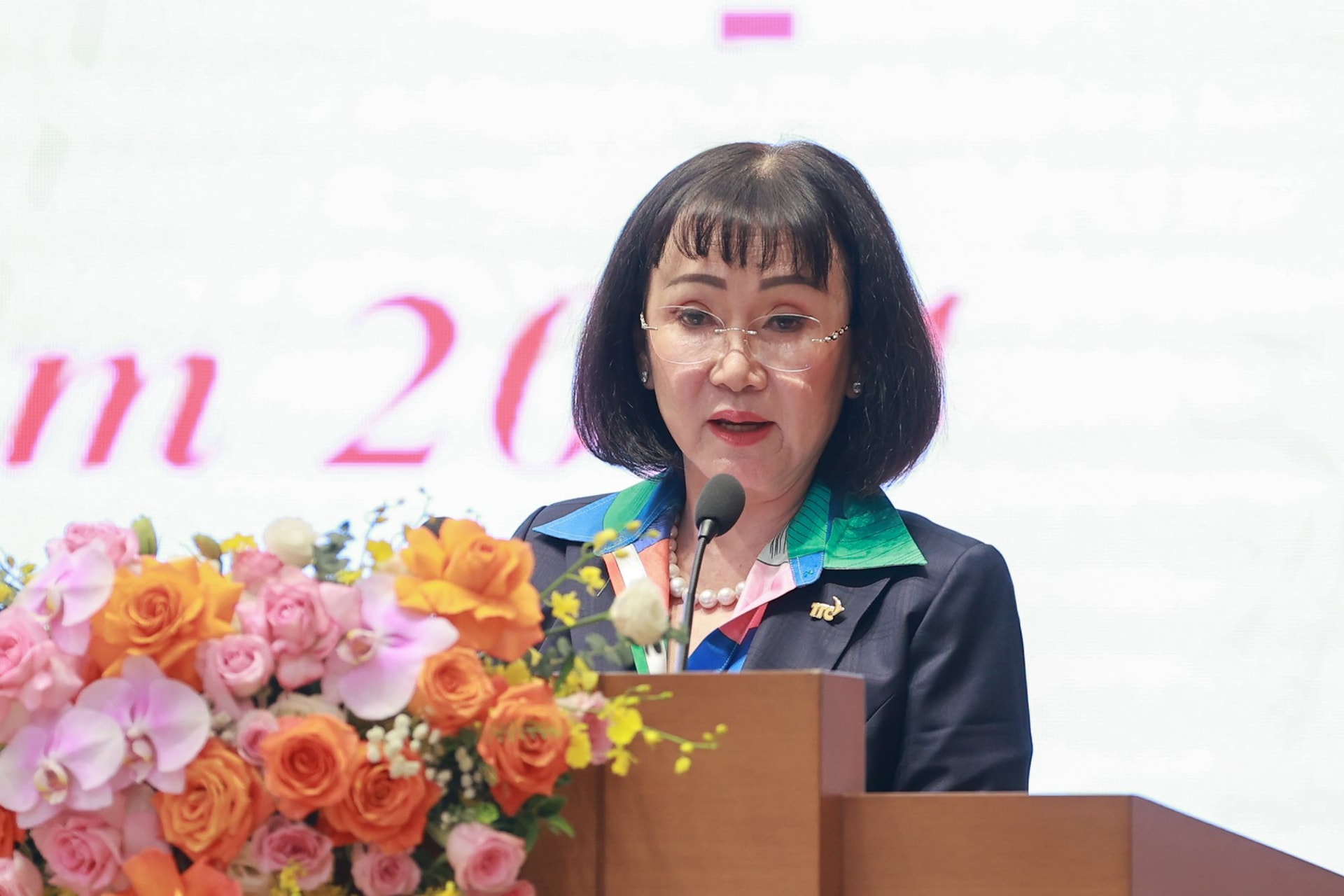Proposing several issues to the Government, a representative of TTC Group suggested that to further promote the circulation of goods and services within the economy and generate a surplus, effectively contributing to the state budget, there is a need for "consumer stimulus" policies.

Ms. Huynh Bich Ngoc, Executive Vice Chairwoman of TTC Group. (Photo: VGP)
Speaking at the meeting between Prime Minister Pham Minh Chinh, the Standing Government, and business representatives on Vietnam Entrepreneurs Day, Ms. Huynh Bich Ngoc, Executive Vice Chairwoman of TTC Group, praised the leadership of the Prime Minister and various levels of government. She acknowledged that their timely and effective policies had helped stabilize the macroeconomy, control inflation, and boost growth, despite the volatile global context.
Representing TTC Group, Ms. Huynh Bich Ngoc made several specific proposals to the Government to contribute toward broader development goals:
First, she noted that since early 2024, the Government had made timely and correct decisions by reducing value-added tax and instructing commercial banks to adjust loan interest rates, thereby supporting the economy. However, she suggested that in order to further enhance the circulation of goods and services within the economy, and to generate surplus contributing effectively to the state budget, "consumer stimulus" policies are necessary.
As an example, Ms. Ngoc cited several regional countries like Thailand, Malaysia, and the Philippines, which implemented cash support programs for consumer spending, or Singapore, which provided shopping vouchers through similar financial support schemes. For Vietnam, she proposed considering the issuance of shopping vouchers for citizens to be used within a certain timeframe.
These vouchers could focus on balancing the goods that need to be promoted with the real needs of the people. This way, goods and services would circulate, the state would collect revenue, and the logistics ecosystem along with associated services would develop. In addition, such a voucher system could complement the reduction in personal income tax, as the vouchers themselves act as a form of tax reduction.
Second, Ms. Ngoc highlighted that certain provisions in the Law on Credit Institutions need to be reconsidered, such as determining the entity responsible for managing real estate-backed assets in bond issuance. Currently, commercial banks are no longer permitted to perform this role, while the Land Law allows economic organizations to receive mortgages, but no implementation guidelines have been issued. This has made it difficult to determine the responsible entity for managing real estate-backed assets in bond issuance.
TTC Group's representative called on relevant authorities to promptly issue clear guidelines to facilitate capital market development and enhance transparency and efficiency.
Third, she proposed that the capital market should be developed into a more important fundraising channel, especially by encouraging the diversity of securities products, such as in telecommunications, technology, renewable energy, and retail sectors.
TTC suggested that the Government create mechanisms and policies to encourage private enterprises to list new types of goods on the stock market to attract more long-term foreign investment. Additionally, to achieve green economic and financial goals, there should be policies to encourage the development of specialized ETFs (Exchange Traded Funds) that invest in businesses meeting international ESG (Environmental, Social, and Governance) standards. This would not only provide more investment options for foreign investors—thus increasing foreign capital absorption in Vietnam’s capital markets—but also encourage businesses to develop according to international ESG standards for sustainability.
Fourth, she emphasized that the development of an international financial center is essential and has received significant attention from the Party and State leadership. Vietnam has great potential with its large population and rapidly growing domestic financial market, as well as its favorable time zone relative to the 21 largest existing financial centers worldwide.
Building an international financial center would support the diversification and sustainable growth of Vietnam's capital markets, complementing the monetary market. It would also contribute to boosting the private sector's development and enhance Vietnam’s position internationally. These advantages could help develop Vietnam into a regional financial hub, attracting major investors and contributing to the sustainable development of the capital market.
TTC’s representative also urged the Government to consider breakthrough policies to create an open environment for investors, recommending that areas with sufficient potential, strengths, and uniqueness—such as a green environment conducive to the green economy, good infrastructure suitable for the digital economy, and ample land resources with proper and modern planning—be identified to attract large-scale capital investors. Based on this, a proposal to develop an international financial center with distinct Vietnamese characteristics should be developed, calling for contributions and collaboration from private enterprises to complete the financial ecosystem.
(Source: CafeF)